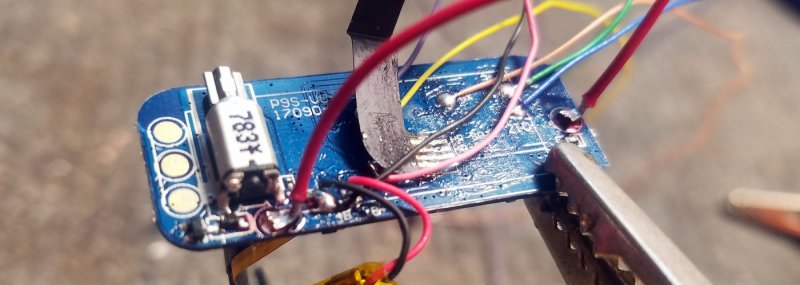Several years ago, a company called Neurosky came out with an interesting chipset meant to be put in an EEG headset. This chipset would track your brainwaves, do some fancy math, and output a few numbers based on the Delta, Gamma, Alpha, and Beta waves in your brain. Of course, the senseable thing to do with this technology would be to put it in a Star Wars-branded toy where you pretend to be a Jedi. All was good with the world, and a few people hacked these Jedi Mind Trainers for some interesting builds.
But the Neurosky chip was still a black box. No one knew how it worked. The ‘concentration’ number had no relation to anything, except how hard you were apparently concentrating. In an effort to break this black box and build upon years worth of EEG hacks, [Curt White] is hacking a fitness tracker for EEG analysis for his entry into the Hackaday Prize.
The hardware in question for this build is a B20 Fitness Tracker, an ungodly cheap piece of hardware that contains an ADS1292 bioimpedance sensor that can be used for ECG, EMG, and EEG. There’s also an nRF microcontroller with Bluetooth that’s easily programmed with an Arduino. All the building blocks are there.
Right now, [Curt] has successfully opened up one of these fitness trackers and has done enough of a teardown to get the data off of the bioimpedence sensor. The trick now is to emulate the ‘concentration’ and ‘relaxation’ values the Neurosky chip puts out. This is fairly difficult, as what these values actually mean in terms of brainwaves is a bit opaque, but [Curt] has some filters and some tools to pull data from the brain and output something. Now it’s just a question of outputting the right values.
It’s a fantastic hack, that is sure to be a lot more affordable than buying some old Star Wars toys or paying a licensing fee to Neurosky. This is commodity hardware hacked to do something it was never intended to do, and an excellent entry to this year’s Hackaday Prize.



















Using black-box testing to tease out needed information.
I’m not sure what is on the market for open source ECG and EMG analysis. However, there are a few open source software applications for EEG’s on the market that I am aware of and here is the latest quick check (there are more than I thought out, awesome):
CRAN (R):
https://cran.r-project.org/web/packages/eegkit/index.html
Cartool (C++):
https://sites.google.com/site/cartoolcommunity/files
Matlab related:
https://github.com/hadrienj/EEG
https://github.com/mortonne/aperture
Awesome project!
Neuro Platform SimbiosCFV.. its this Awesome!!!
Do you have any references to “Neuro Platform SimbiosCFV”. I’ve never heard of before.
I did find a neat reference https://nimg.neuroinf.jp/, though is more in line with a data resource for OpenWater’s developer kit that isn’t quite main stream yet: https://www.openwater.cc/technology.
The price is what amazed me. I’m like wow!!! ~$35. I think I’m finally going to invest in since the pricing isn’t as high as the Emotiv or even Neurosky kit. Really neat to see the price point go down and is still even more cost effective if you gang up 14 to have that many channels. though would be bulky unless a custom board is made… still.
I’m betting the OpenWater tech will really be an eye opener in pricing once initial costs are recovered or maybe even right from the get go if high volume sales are in the marketing plan at first. Curt sold me on investing in this method for now to experiment with. Share references if you have to the “Neuro Platform SimbiosCFV” if you have.
Am I the only one who read the title and thought something was goung to be turned in an egg? Was expecting a 3D printed egg-shaped case at the very least!
You are not the only one.
Please don’t tell us where you were going to stick your egg-shaped fitness tracker.
We were hoping the article would tell us that!
B^)
That would be the stealth way to detect signals. Have one egg for background body and noise phase cancellation and the other for remote sensing or even better directional finding. :-)
Thanks for writing about my project! Full disclosure, the way I got it to consistently work probably has as much to do with EMG artifacts from muscle tension during concentration as Alpha, Beta and Theta EEG waves. For all I know NeuroSky is doing the same thing, wouldn’t surprise me in the least. That being said I’m extremely pleased with the results, EMG artifacts or not.